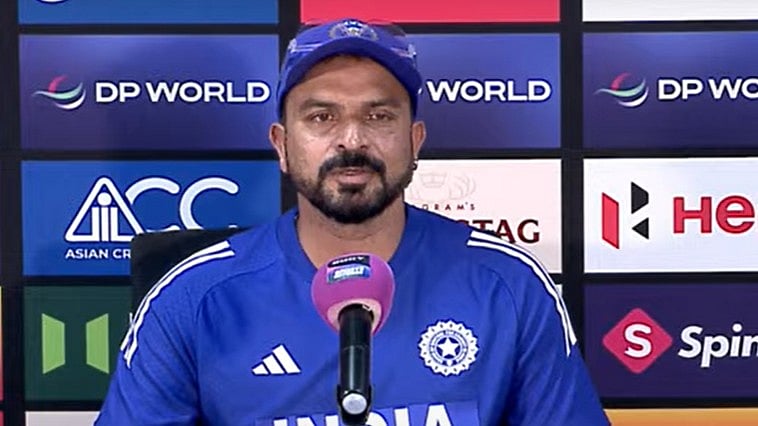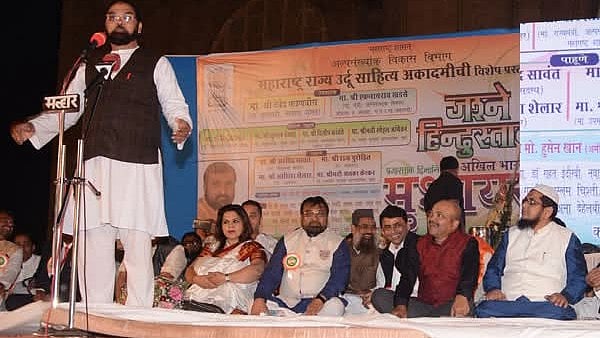Four Marathi films are part of the Maharashtra’s showcase at the Marche Du Film, which is an integral part of the 78th Cannes Film Festival that will be on until May 24, 2025 in Cannes, South of France. Maharashtra Film, Theatre and Cultural Development Corporation which has been setting up a booth since 2016 is a window for many Marathi filmmakers to show case their work.
This year, director Gajendra Ahire has two films to be screened here, Snow flower and Paro, produced by Trupti Bhoir and directed by Ahire.
Snow Flower, which also won the best film at Pune International Film Festival (PIFF) 2025, has received a good response at Cannes as well.
Gajendra Ahire opened up about being in Cannes for the first time. “There were 46 films in competition for the Cannes showcase and three were chosen. Snow flower is one of them,” Ahire informed. “My film is a collaboration between India and Russia. We shot in Siberia in a city called Khanty-Mansiysk. It was so cold, almost minus 14 degrees, but it was needed. I wanted snow and coldness that engulfs us all to bring in that emotion of being lost in another world. My film deals with the idea of how everything is so distant now days, with everything at touch of button, but emotions, bonding of the family are also important and this is what I have depicted,” said Ahire.
The premise of the story follows a small girl (portrayed by Manva Bhagwat) whose Indo-Russian parents die in an accident, and she is sent to an orphanage by the country. But when her grandparents in Konkan India find that out, they reach out to the officials suggesting that the Indian grandparents can take care of her and that she is not an orphan. Since the girl was born in Russia to a Russian mother, she belongs to that country, which then brings this dilemma to the fore of who does the child belong to or where will she live?
Ahire said, “This film is about the emotional toll it takes on the grandparents as well as of the little girl and how the law plays its role in creating a traumatic journey for all of them. We are all ruled by emotions, but we also have rules and law in place, so how does one deal with it?”

Ahire has been dealing with this storyline; of growing distances among families since his film Pimpal. “I am trying to address this growing problem through my films and make a trilogy, where finding oneself and one’s roots has become a bigger question which even Snow Flower poses,” Ahire said. “Here, the girl is born in Russia but her father is Indian. She is like a flower in the snow. If you bring her to India, where are roots don’t grow, she will wither away. But what to do with emotions? My film questions that,” he added.
Ahire admitted that he loves playing with intricate human emotions in his films. More so now. “Until yesterday we were living in the same house. Children and adults were living together. Now children have their own lives. But how can parents be cut off suddenly? So it's a different trauma. The state of mind, age, and work I am in now, I feel like the next generation is going to leave. Andthe state of mind we are in, that's when these things start playing in the mind.”
Ahire shot the film during the Russia-Ukraine war and, thankfully, there were no hiccups. Filmmaking is always difficult. Shooting in the snow was particularly difficult. “However, it was needed for the film to show a contrast to the verdant green of Konkan, to show alienation and abundance of both the seasons,” Ahire informed.
His second film is Paro, though not part of the official selection from Maharashtra, is brought here by the executive producer and actress Trupti Bhoir. This film is gaining attention for its unusual story of bride slavery and is being screened at the Confederation of Indian Industry at the Marche Du Film.

Talking about the film’s journey to Cannes, Marche Du Film, Ahire said, “This is a crucial international festival for most of the directors. There is exposure for the film market, but we need to build upon a wider film audience. We are making films, but do we always get an audience? I don’t think so. We have a divide among our audiences who simply want to enjoy a film and don’t look at it as a craft. As director Shekhar Kapoor said during one of the sessions here, ‘We have dominated cinema with different things. Does cinema decide only the audience? This is a big issue. We have to make the audience happy. We have to make films for people who eat popcorn who nowadays decide the fate of the film. But I call it a transition phase…’ I agree with him.”
Ahire reiterated the importance of such film festivals for global reach. “I want to get exposure for the film. I want the film to reach more people. I think it should be the goal of every director. I want to make international connections in Cannes as it is a global film,” Ahire concluded.










